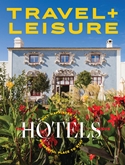For example, P&O found that the majority of their passengers for India and the Far East joined the ship at Marseilles. Consequently, they marketed holidays based upon sea trips from London to Lisbon and Gibraltar. Other companies diverted their older ships to operate cruises in the summer months.
However, the real age of international mass travel began with the growth of air travel after World War Two. In the immediate post-war period, there was a surplus of transport aircraft, such as the popular and reliable Douglas Dakota, and a number of ex military pilots ready to fly them. They were available for charter flights, and tour operators began to use them for European destinations, such as Paris and Ostend.

Vladimir Raitz pioneered modern package tourism when on 20 May 1950 his recently founded company, Horizon, provided arrangements for a two-week holiday in Corsica. For an all inclusive price of £32.10s.-, holiday makers could sleep under canvas, sample local wines and eat a meal containing meat twice a day - this was especially attractive due to the continuing austerity measures in post-war United Kingdom. Within ten years, his company had started mass tourism to Palma (1952), Lourdes (1953), Costa Brava (1954), Sardinia (1954), Minorca (1955), Porto (1956), Costa Blanca (1957) and Costa del Sol (1959).
These developments coincided with a significant increase in the standard of living in Britain. Further, the contribution of affordable air travel in combination with the package tour enabled international mass tourism to develop. The postwar introduction of an international system of airline regulation was another important factor. The bilateral agreements at the heart of the system fixed seat prices, and airlines could not fill blocks of empty seats on underused flights by discounting. But if they were purchased by a tour operator and hidden within the price of an inclusive holiday package, it would be difficult to prove that discounting had taken place - even though it was obvious that it had!
Another significant development also happened at the end of this decade. The devaluation of the Spanish peseta made Spain appear a particularly attractive destination. The cheapness of the cost of living attracted increasing numbers of visitors. Mass package tourism has at times been an exploitative process, in which tour operators in a country with a high standard of living make use of development opportunities and low operating costs in a country with a lower standard of living. However, as witness the development of many tourist areas in previously poor parts of the world, and the concomitant rise in standards of living, when there is equality of bargaining power, both parties can gain economic benefits from this arrangement.
Spain and the Balearic Islands became major tourist destinations, and development probably peaked in the 1980s. At the same time, British tour operators developed the Algarve in Portugal. The continuing search for new, cheaper, destinations spread mass tourism to the Greek Islands, Italy, Tunisia, Morocco, Turkey, and more recently Croatia.
For someone living in greater London, Venice today is almost as accessible as Brighton was 100 years ago. Consequently, the British seaside resort experienced a marked decline from the 1970s onwards. Some, such as New Brighton, Merseyside have disappeared. Others have reinvented themselves, and now cater to daytrippers, the weekend break market or business conferences.

1 comment:
Your words sometimes echo in my mind and during my leisure time, i read your write ups again and again.For Chennai Hotels booking , packages & for more information you can visit our website Travelmasti or http://www.travelmasti.com/
Post a Comment